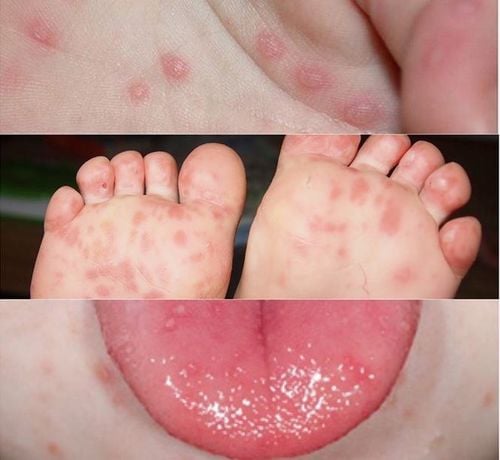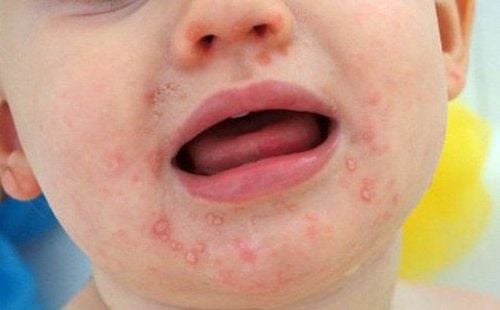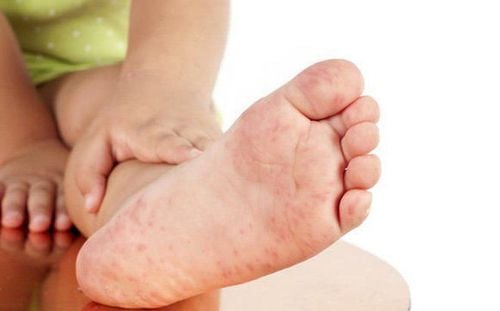This is an automatically translated article.
The article is professionally consulted by Master, Doctor Nguyen Thi An - Pediatrician - Neonatologist - Department of Pediatrics - Neonatology - Vinmec Ha Long International General Hospital.Hand, foot and mouth disease is an acute viral infection that is transmitted directly from person to person, usually in young children. The disease can recur in a patient, parents need to pay attention to observe, clean and treat early to reduce dangerous complications.
1. How is hand, foot and mouth disease transmitted?
Hand, foot and mouth disease is an infection caused by a virus. The disease is capable of being transmitted from person to person through direct contact with nasopharyngeal secretions, saliva, fluid from blisters or feces of an infected person; through sharing utensils. Hand, foot and mouth disease is not transmitted from pets or any other animal to humans and vice versa. In addition, the virus that causes hand, foot and mouth disease can also exist in food, drink, floors, toys, household items or on the hands of caregivers of infected children. Thus, hand, foot and mouth disease can enter the human body through the gastrointestinal tract. The risk of disease transmission is greatest during the first week after infection, but the infectious period persists for several weeks (because the virus is localized in the stool).2. Signs to recognize hand, foot and mouth disease
Signs of hand, foot and mouth disease include:Fever: The child may have a low-grade fever or a high fever. When a child has a high fever but cannot lower it, this is a warning sign that the disease is in a severe stage. Skin lesions: There are blisters on the skin in special locations such as the throat, around the mouth, on the palms of the hands. soles of feet, buttocks, knees... Children may have mouth sores, loss of appetite, vomiting, increased salivation, diarrhea, fatigue, fussiness... Parents need to pay attention to observe unusual manifestations children and need to take them to a reputable medical facility that specializes in children's infectious diseases so that doctors can examine, monitor and treat in time, to avoid the disease progressing worse, causing serious illness. dangerous complications, even death.

Tổn thương ở da là một trong các dấu hiệu nhận biết bệnh tay chân miệng
3. Who is susceptible to the disease and will hand, foot and mouth disease get it again?
Adults are also at risk of catching and developing hand, foot and mouth disease. However, hand, foot and mouth disease often occurs in children under 5 years old, especially in children under 3 years old because the body's immune system is still weak.Moreover, hand, foot and mouth disease can recur again and again if the person who has had the disease still comes into contact with someone with hand, foot and mouth disease. In each case, the level of danger depends on the virulence of the virus causing the disease and the location of each patient. Symptoms of the disease are the same: mouth ulcers, lesions on palms, feet.
4. Is there a hand, foot and mouth vaccine?
There are 11 types of viruses that cause hand, foot and mouth disease. Each infection only produces antibodies to a certain virus, so it is possible to get sick again if infected with another enterovirus. And there is currently no hand, foot and mouth vaccine.5. Measures to prevent hand, foot and mouth disease
To prevent hand, foot and mouth disease for children, parents can take preventive measures for their children at home such as:Clean hands for children and caregivers with antibacterial soap or solution before preparing them. food for the baby, after going to the toilet and after taking care of the child

Vệ sinh tay sạch sẽ giúp phòng tránh bệnh tay chân miệng
Master. Doctor. Nguyen Thi An, former Head of Pediatrics Department, Quang Ninh General Hospital, is a person who is very passionate about health care for children and successfully treats many difficult cases. Currently, he is a Pediatrician - Neonatologist - Neonatology Department of Vinmec Ha Long International General Hospital.
Please dial HOTLINE for more information or register for an appointment HERE. Download MyVinmec app to make appointments faster and to manage your bookings easily.













